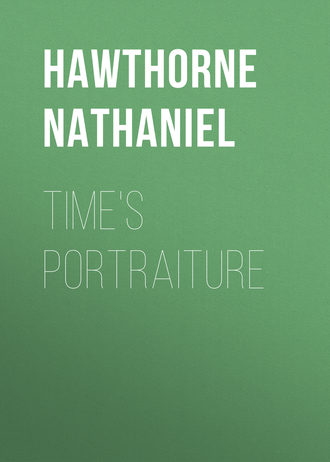
Натаниель Готорн
Time's Portraiture
We will now consider Time as a man of business. In this capacity, our citizens are in the habit of complaining, not wholly without reason, that Time is sluggish and dull. You may see him occasionally at the end of Derby Wharf, leaning against a post, or sitting on the breech of an iron cannon, staring listlessly at an unrigged East Indiaman. Or, if you look through the windows of the Union Marine Insurance Office, you may get a glimpse of him there, nodding over a newspaper, among the old weather-beaten sea-captains who recollect when Time was quite a different sort of fellow. If you enter any of the dry-goods stores along Essex Street, you will be likely to find him with his elbows on the counter, bargaining for a yard of tape or a paper of pins. To catch him in his idlest mood, you must visit the office of some young lawyer. Still, however, Time does contrive to do a little business among us, and should not be denied the credit of it. During the past season, he has worked pretty diligently upon the railroad, and promises to start the cars by the middle of next summer. Then we may fly from Essex Street to State Street, and be back again before Time misses us. In conjunction with our worthy mayor (with whose ancestor, the Lord Mayor of London, Time was well acquainted more than two hundred years ago) he has laid the corner-stone of a new city hall, the granite front of which is already an ornament to Court Street. But besides these public affairs, Time busies himself a good deal in private. Just at this season of the year, he is engaged in collecting bills, and may be seen at almost any hour peregrinating from street to street, and knocking at half the doors in town, with a great bundle of these infernal documents. On such errands he appears in the likeness of an undersized, portly old gentleman, with gray hair, a bluff red face, and a loud tone of voice; and many people mistake him for the penny-post.
Never does a marriage take place, but Time is present among the wedding-guests; for marriage is an affair in which Time takes more interest than in almost any other. He generally gives away the bride, and leads the bridegroom by the hand to the threshold of the bridal chamber. Although Time pretends to be very merry on these occasions, yet, if you watch him well, you may often detect a sigh. Whenever a babe is born into this weary world, Time is in attendance, and receives the wailing infant in his arms. And the poor babe shudders instinctively at his embrace, and sets up a feeble cry.
Then again, from the birth-chamber, he must hurry to the bedside of some old acquaintance, whose business with Time is ended forever, though their accounts remain to be settled at a future day. It is terrible, sometimes, to perceive the lingering reluctance, the shivering agony, with which the poor souls bid Time farewell, if they have gained no other friend to supply the gray deceiver's place. How do they cling to Time, and steal another and yet another glance at his familiar aspect! But Time, the hard-hearted old fellow! goes through such scenes with infinite composure, and dismisses his best friends from memory the moment they are out of sight. Others, who have not been too intimate with Time, as knowing him to be a dangerous character, and apt to ruin his associates, – these take leave of him with joy, and pass away with a look of triumph on their features. They know, that, in spite of all his flattering promises, he could not make them happy, but that now they shall be so, long after Time is dead and buried.







